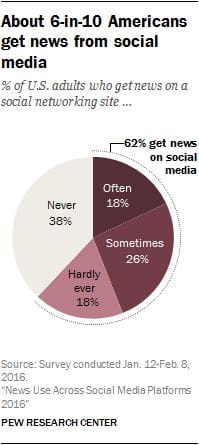Don't Be Duped: Why Media Manipulators Love Social Media

Americans rely on the Internet now more than ever for news, information, and discussions about politics. According to Pew, nearly half of U.S adults between the ages of 18-49 rely primarily on the Internet and social media for their news, and 62 percent of all adults use a social network like Facebook or Reddit to get their news.
Yet, as voters rely more heavily on the cloud for trustworthy information, few remain cognizant of how susceptible they really are to carefully crafted misinformation campaigns designed to benefit the highest bidder.

With more news being consumed online than ever, one trending hashtag is all it takes to reach millions of people in a matter of minutes. The viral nature of the Internet hive-mind is now a favored tool for media manipulators -- agencies devoted to the pervasion of false or intentionally misleading information.
In February, Forbes’ Jay McGregor published an explosive report about ‘shill’ accounts on Reddit, the world’s 22nd most trafficked website. According to the report, high-ranking fake accounts were routinely utilized by financial services.
From McGregor’s report:
“In December last year, I managed to place two entirely fake news stories onto influential subreddits - with millions of subscribers - and vote them to the top with fake accounts and fake upvotes for less than $200. It was simple, cheap and effective.”
The presence of fake, shill, or ‘sock’ accounts on social media sites designed to push any paid agenda is nothing new, but the Forbes report illuminated how profitable the economy of fake news has become and how little attention some pay to the credibility of a news report.
During the 2016 election, thousands of fake and shill accounts were created to support candidates on both sides -- Democrats and Republicans alike. The Canadian Broadcasting Corporation documented the phenomenon on Twitter, finding thousands of fake accounts tweeting and retweeting pro-Clinton and pro-Trump messages.
CBC reported, “Philip Howard, a professor of internet studies at Oxford University's Internet Institute, estimates that fully a third of all the tweets in favour of Donald Trump... are generated by automated accounts."
Similarly, about a quarter of all pro-Clinton tweets came from automated accounts. The Clinton-aligned PAC, Correct the Record, also made headlines for its multi-million-dollar campaign that flooded sites like Reddit, Facebook, and Twitter with pro-Clinton propaganda.
So what is the discerning news reader to do?
Get out of your comfort zone
As is the case with most things, it can be tempting to fall into a routine when it comes to news habits. Facebook, Reddit, and Twitter users overwhelmingly depend on their favored social media site for news. Regularly look to new places for the news that interests you. If it seems biased one way or the other, stop to ask yourself why that’s the case. Question your own preconceptions on the topic and do some extra research to see if they were well-founded.
Check the source
About 46 percent of news consumers don’t recall the name of the outlet where they discovered a piece of news. Being more mindful of where a report originates from and weighing the trustworthiness of the source is an effective way to combat misinformation.
Be skeptical of commenters and popularity
One tactic of media manipulators is to overwhelm or distract the conversation with offensive or misleading tactics. Don’t look to the comment section to reinforce the credibility of a story. Likewise, just because a story is popular or trending, doesn’t mean it’s accurate or presents the full picture. Catchy headlines can be undermined by the story itself. Read the full article and decide for yourself if the information is substantiated and trustworthy.
Look for more than one report from independent sources
Dozens of seemingly distinct news outlets can easily be controlled by a sole proprietor. If a story truly is as explosive as the headline suggests, other independent outlets are sure to have some coverage. See what they have to say.
Image: antb / Shutterstock.com



